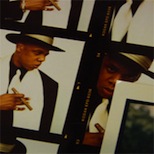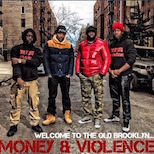Politics As Usual
06.16.2011
LEISURE
Since 1981, Mumia Abu-Jamal has been on Death Row. Though the former activist and radio journalist was convicted of killing a police officer Daniel Faulkner, many believe he is innocent and that he did not receive a fair trial. Abu-Jamal’s plight has been the subject of much controversy with respect to race-relations in 1980’s America, police brutality and purpose of the death penalty. So much so, that it inspired playwright A. Zell Williams to craft In A Daughter’s Eyes, a play centered around a fictional relationship between the respective daughters of Abu-Jamal and Faulkner. Life + Times recently caught up with Zell to discuss his play, politics and how the past can haunt you.
Life+Times: Your play In A Daughter’s Eyes is based on a controversial real life conviction. Aside from the case itself, what about writing about a true story inspired you? What prompted the decision to create a fictional family within this real world?
A. Zell Williams: To me, reality is more compelling and affecting than fiction. I mean, consider yourself in Mumia’s place. You’ve been on and off of death row year after year, never knowing if this year would be your last. Then consider the family of Daniel Faulkner, the slain officer in the case, who are still fighting for some sense of justice. As I see it, both sides of this case were victimized by an unjust trial that came to a conviction so flawed that it’s still being debated thirty years later. And the decision to fictionalize the families in the play was made out of respect to the Abu-Jamals and the Faulkners. I wanted to explore America’s legacies of racism, violence, and social injustice, which both of those families know all too well. But it’s not a biography.
L+T: What was it about Mumia Abu-Jamal that drew you to his story?
AZW: I love a fighter. One day I was listening to some old KRS-One and I ran across a song called “Free Mumia.” I’m ashamed to admit it, but I had forgotten who Mumia was. I went back and started to research him and was moved by that fact that he never became bitter in his writings. When you read interviews and his books, they’re always focused on informing the reader and bettering society. Again, I’ve tried to imagine what I would be like if I was in his place and I know I don’t have that kind of strength. He’s someone who has never let imprisonment take away his freedom and I don’t know anything more dramatic than that.
L+T: In writing this play, what is something you’ve come to learn that you were unaware of before? What is something you hope your audience becomes aware of?
AZW: I’ve become very aware that America doesn’t really remember the Black Panther Party, or at least what the party actually stood for. Mumia was a very active member of the Philadelphia chapter when he was arrested, so naturally I started researching the BPP. It’s unbelievable to me that most people believe they were just a Black Power organization. They were for (to paraphrase Fred Hampton) black power to black people, white power to white people, yellow power to yellow people…IT WAS THEIR SLOGAN! All power to the PEOPLE! They were actual socialist. So that’s one thing I hope my audience takes away. Another thing I hope they pay attention to is the important role women have played in recent revolutions. Rehema’s character was largely inspired by Elaine Brown, the only woman to lead the national Black Panther Party. I wrote this play as a two-women show because of the fact that they are too often ignored in historical events. The effect these events have on women are just as divesting as they would be on men. How they embody the same amount of passion and rage is unique and important to understanding the current state of American justice.
L+T: What do you hope to illuminate about The Black Panthers and Abu-Jamal in particular?
AZW: My main concern is that people remember them. It was proven a long time ago that our government – federal, state, and in some cases cities such as Chicago – were responsible for the unjust incarceration and attempted and successful murders of BPP members. Additionally, Mumia has vacillated on and off death row for three decades and we as a people are responsible. One of the major themes in In A Daughter’s Eyes is the danger of ignoring our past. It always comes back to haunt us.
L+T: You’ve said your characters are stuck in a cycle. What cycle are you, or we, stuck in?
AZW: Oh, what a dangerously loaded question…Personally, I’m always asking myself what the best way to effect change is. A friend and mentor used to tell me, “When your greatest desires meet the world’s needs, you have found your calling.” I love writing and I know that there’s a great need for social and political equality in the world. But I’m not always sure that the best way to inspire that change is through art. As for “we,” I fear we’re stuck in a cycle of fear and confusion; and one feeds off of the other. As a country, a lot of us are hurting economically. But those same people just sent representatives to Washington, who only want to give money to individuals who are already wealthy?? We’re also stuck in a cycle of pride; the thought that we’re just fine and it’s the rest of the world that’s wrong. In regards to those thoughts, I’m gonna make my Moms really proud and quote the Bible: “Pride goeth before destruction.”
L+T: Structurally, theater can be much more of a free for all, as opposed to television, whose structure is dictated by the number of commercials that the network has to run. What does this freedom mean to a storyteller?
AZW: It means I can tell it how and when I want. But like with all great power, it comes with a great responsibility. I’m responsible for making sure your box has all the puzzle pieces. I’m responsible for showing how it goes together. I am not responsible for the picture you see. When you come to see mine or any other play, you’d better be ready to get your hustle on. And if a theatre isn’t demanding you do that, don’t go to that theatre! You deserve better!
L+T: Your next play is about a rap star and his biographer. What’s the main theme at the heart of the story?
AZW: What does an artists of color have to do to get produced? As a black artist, I’m fascinated by the images of Black America that make it to the mainstream. I’m even more fascinated by the trends my people support and why. Plus, it’s a great excuse to get a DJ spinning in the Kennedy Center!
L+T: Plays aren’t nearly as popular as other competing fiction mediums, yet they provide a much more real and personal experience. Why the lack of mainstream popularity?
AZW: Access. The average cost of a theatre ticket in the US is pricey for most families. Plus, the industry has been slow to explore the issues and themes found in the works of non-white artists. A lot of theatres companies only do one show by and about people of color then complain that the audience doesn’t come back. Invest in development and productions of new work by new artists and you’ll develop a new audience.
L+T: Favorite intermission snack/drink?
AZW: Yogurt-covered pretzels and Maker’s Mark, neat.





